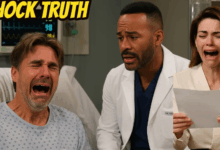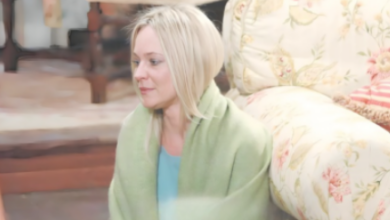HOT SHOCKING UPDATE!! CBS Y&R Spoilers Sharon has a massive brain tumor and could die – will Nate go back for surgery?
The atmosphere was somber as mourners gathered for Heather’s funeral in
“The Bold and the Beautiful,” their sorrow laced with an unspoken tension.
Family and friends filled the room, united in grief but torn by secrets that bound them.
Then, Sharon, standing at the front, broke the silence. Pale and visibly shaken, she took a deep breath and delivered a confession that left everyone stunned: “I killed her.” Her voice, though soft and tremulous, echoed with a raw intensity.
A shocked gasp swept through the crowd, but it wasn’t one of disbelief. On the contrary, her confession met with an eerie sense of acceptance, as if her admission only confirmed what many had quietly suspected all along. Her words hung in the air, laden with the weight of guilt and remorse. Yet, as Sharon continued, she revealed a new twist—a justification that complicated her story even further. Touching her head, her hands trembling, she disclosed, “I have a brain tumor. It’s made me lose control, changed who I am.” She pleaded for understanding, insisting that the illness had driven her to act out of character, turning her into someone even she no longer recognized.
But her explanation did not spark the compassion she might have hoped for. Instead, a murmur of skepticism rose among the crowd. Could this be just another manipulation? A calculated excuse to elicit sympathy? For many there, Sharon’s claim of a brain tumor felt dubious, a convenient scapegoat for a history of destructive behavior that had long preceded any mention of illness. A few in the crowd felt a twinge of pity, but it was not enough to erase their distrust. After all, Sharon had a well-known past of deceit and manipulation, often wielding others’ emotions to her advantage.
Her tragic spiral, Sharon explained, had been fueled by jealousy—especially of her daughter Faith’s growing bond with Lucy, whom she saw as a threat. Desperation to keep her daughter close had festered within her, twisting her motives until they erupted in dark, destructive actions. She admitted that her resentment had grown monstrous, leading her down a path of betrayal that none could ignore. Her explanation might have shed light on her actions, but it did little to absolve her in the eyes of those listening.
As she poured out her soul, Sharon made a final, desperate plea. She begged for surgery to remove the tumor, hoping that a fresh start, free from the influence of her illness, could help her rebuild the trust she’d shattered. “I need this surgery,” she choked out, her voice tinged with fear and regret. “Or I don’t know what else I might do.”
But her appeal faced an impassable wall of doubt. To the mourners, Sharon’s plea wasn’t merely a request for a medical intervention—it represented a potential return of a deeply damaged person to their lives, someone who had crossed moral boundaries too many times. The thought of entrusting her care to a surgeon, possibly Nate, stirred unease in the room. Sharon’s need for the surgery was real, but so was the apprehension that her healing would mean her reintroduction into a community that no longer trusted her.
As she looked out at the faces of those she once called friends, Sharon’s hope dwindled. No one came forward; no one offered comfort or assurance. Her cries for forgiveness were met with the cold, distant stares of people who no longer saw her as one of their own. Her vulnerability was laid bare, but sympathy was in short supply. The room felt hollow as her final pleas echoed unanswered, a poignant reminder of the unforgiving reality she now faced. In that moment, Sharon stood utterly alone, confronted by the consequences of her own tragic choices.








